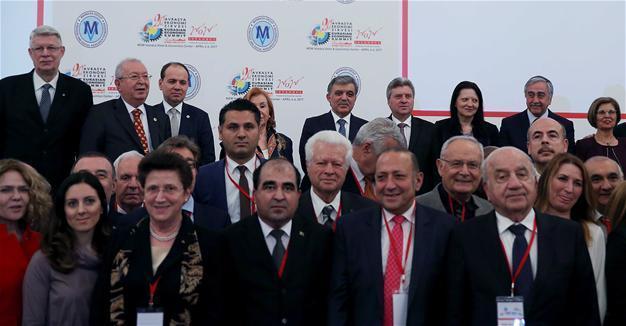Eurasian Economic Summit makes ‘call for humanity’
ISTANBUL
 The 20th Eurasian Economic Summit, which was held in Istanbul between April 4 and 6, has made a “call for humanity” in a final declaration it released over the weekend.
The 20th Eurasian Economic Summit, which was held in Istanbul between April 4 and 6, has made a “call for humanity” in a final declaration it released over the weekend. “Humanity is at crossroads. Maybe we are at the last stop, maybe we have one more chance that we have not used yet,” said the declaration’s headline.
“The crisis, which the European Union is facing, is weakening the essential principles of the establishment. It needs a powerful and democratic Europe for stability and enhancement. Member countries have not succeeded to make common decisions and they have been away from the institutional principles,” it said.
“When every country attempts to solve their own problems with their traditional way in Europe, where the new policies, new ideas, new vision and strategies are not found out, the rising Islamophobia and populism have become inevitable. In the face of waves of refugees, the borders have been closed down; the walls have been put against the pains,” it added.
The declaration urged the world to internalize the refugee issue.
The war in Syria led Europe to have a migration problem. Turkey and the European Union were exposed to a huge wave of refugees. If new solutions and policies, with a new point of view, are not formed, this problem will cause more damages. The problems of migration and refugees should be handled within the economic, political and environmental reasons. The European Union sustaining its presence at a global role within a consensus depends on its’ attitude toward these crises. Due to the fact that annihilating the crisis of migration and refugee depends on annihilating the reasons, Europe needs to generate fast and correct forms of solutions that reveal the global power and prestige of Europe,” it said.
The summit also agreed on a need to collaborate against global terrorism.
“We are making a call for sustaining the democratic standards, engaging the new legal structures and implementing common sanctions against the countries that support terrorism, in the fight against terrorism,” the statement read, adding that religions must not also remain silent.
“Religion is unifying, politics is discriminating. We defend the fact that religious organizations need to stay in a civil area; out of the legal area. The principles that guide us in applying available human rights are to a large extend by means of our background that we have provided from the attitude of world religions toward human rights. We know that both religions and human rights protect the human honor. We want dialogue between religions against terrorism,” it said.
The declaration also highlighted the United Nation’s role and responsibilities.
“We want reorganization within the United Nations. We find it inevitable. There are five members in the U.N. Security Council; their works are based on the model of compatibility of their interests. When they do not get along with each other, people and humanity compensate for the damages,” it said.
“The U.N. must be the guardian of global justice. We want it to be an institution that eliminates the distinction of small and big states, works for the common stability and welfare, establishes rules, and relieves the pains of war and genocide.”
The summit welcomed four presidents, the governor of an autonomous region, nine former presidents, two former prime ministers, many other statesmen, and 323 foreign guests comprised of diplomats, businesspeople, academics and religious leaders.
















